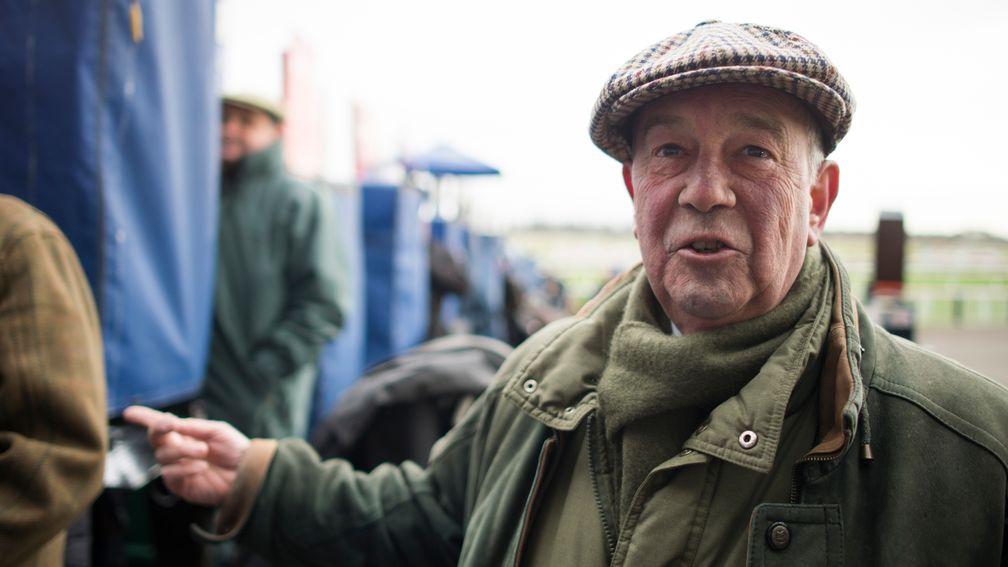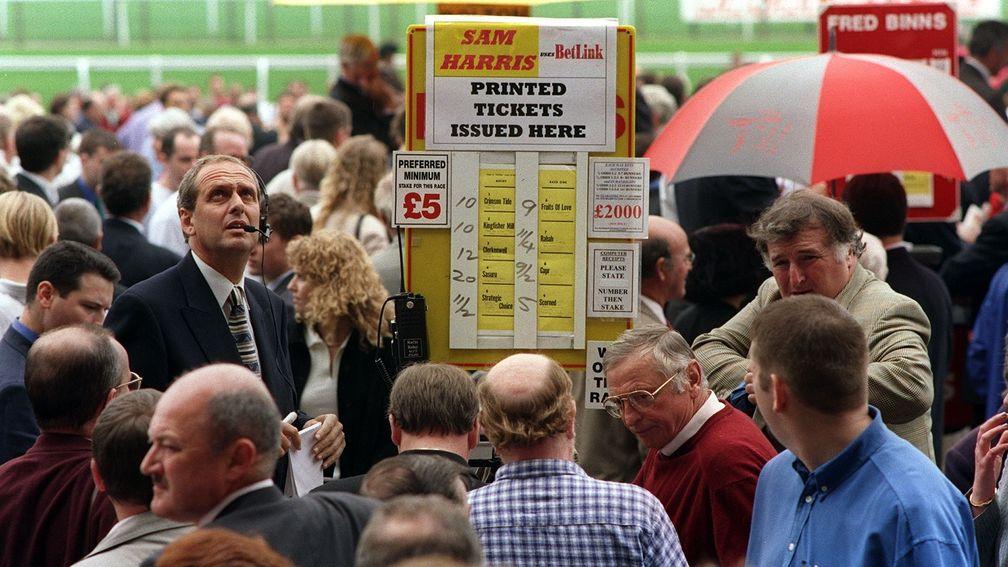How to become a bookie: preparing for the perils of life in the betting jungle
'It looks easy but I've seen a lot come in like lions and go out like lambs'

How do I become a bookmaker? Some might say the more pertinent question is: Why would I become a bookmaker? With the betting ring routinely reported to be in freefall since the advent of Betfair, the number of hardy souls prepared to stand in the ring day in and day out is dwindling by the year, but there are still those who are attracted by the way of life and the potential for profit, so if you are among them, how do you go about becoming a bookmaker?
It's a family affair
Adrian Pariser, better known to racecourse regulars as Sam Harris, is one of the old school whose links with the industry were passed down by inheritance.
"It's a family business," he explains. "There was grandfather, father, me. In those days you had to go through a magistrates' court to get your licence and then renew it every few years but, as I recall, because I was just carrying on the family business there were no great problems getting a licence of my own.
"Increasingly small numbers want to become bookmakers but my son Mark, who works for me the same way I worked for my father, is thinking of taking a pitch himself. I've been online today, on the Gambling Commission website, going through the process."
'If you don't understand figures you will lose'
Robin Grossmith, 69-year-old director of the Federation of Racecourse Bookmakers, has seen many in his profession come and go. He comes across all different types and has clear views on who will make it – and who won't.
"Some of them are following in family footsteps and they're likely to be the ones who are successful," he says, "because they've been brought up in it, so they understand the business. You get people from the City who are fascinated by it and think it doesn't look too difficult, but I've seen a lot of them come in like lions and go out like lambs. Computers have brought simplicity to the job, but you can't get away from the fact that if you don't understand margins or figures you'll lose.
"I think the worst thing you can do is know horses, because if you know horses you become a judge and if you become a judge you're going to have a horse on your side who messes up the margins you bet to, and if you don’t have a margin you won't win. If anybody is that good a judge, they wouldn't want to be a bookmaker, they'd just be a punter.”
You need money to make money
So, you have a family connection or a good head for figures and an understanding of the game. How do you go about getting into bookmaking and how much will it cost? A lot more than it used to, that's for sure, as Grossmith confirms.
"I've been 35 years on course, betting on the rails, and all you brought with you then was a field book, a pen, flaps to hang over the rails, and away you went," he explains.
"If you want to become a bookie now, though, the first thing you have to do is apply to the Gambling Commission for a licence, part of which is a Criminal Record Bureau check and, assuming you pass that, you'll then register with AGT [the Administration of Gambling on Tracks Ltd], who administer all the lists and pitches.
"Then you need the equipment: a 'joint' [stand], computers, printers, keyboards. But there are two firms who supply them and if you contact RDT or Elite they can set you up overnight. Then you go to the bank, draw out some money and away you go."

The hard figures
A recent Racing Post survey revealed the costs of setting up as a bookie are roughly as follows:
Gambling Commission application fee: between £160 and £881 depending on how many days you plan to work.
Annual fee: up to £1,346 if you plan to work more than 200 days.
Equipment: Roughly £4,500 for a digital board (plus almost £1,000 for the battery); £2,600 for the joint; £640 for a computer; £220 for a printer. And the obligatory umbrella? Over £400, whether it's raining or not.
"I reckon you'd want about £8,000-£10,000 to get going," says Grossmith, "and you'll need a car big enough to hold it all."
Pitch battles take their toll
Prospective bookmakers should also bear in mind that over and above the setting-up costs they'll need to buy a pitch. These days that can be done through the auction pages on the AGT website, but the better the pitch the higher the cost.
Should they ever come on the market the best 'picks' at the best courses are worth their weight in gold, with the hot spots at Cheltenham valued at around £250,000 and two top pitches at York recently changing hands for £200,000. Even then, it takes expertise to make them pay.
Is the game worth the candle?
It's an expensive business becoming a bookmaker and even then it can be hard to squeeze a profit from a dwindling market on a wet winter Tuesday. So is there a future for an on-course layer?
"I think most bookmakers would be ideal to work in the City or in finance," says Grossmith, "and with the uncertainties in life now, I'd think long and hard about something more secure than bookmaking. Having said that, it's been a wonderful life and I've enjoyed every single minute of it and I still do. It's different now but that's just progress, no different to the City, and our business has only followed where the rest of the world has gone."
From the ring to the high street
If the betting ring sounds like too much of a jungle, there's always a career with one of the major firms. Ladbrokes Coral are always on the lookout for the right talent; their needs are diverse but making the betting business seem attractive isn't as easy as it may sound.
"We conducted some research on students and it really wasn't very flattering," says Sepha Brook, manager of emerging talent. "Only eight per cent were prepared to consider a career in the betting and gaming industries – although that figure went up to 50 per cent when they knew about our practical approach to problem gambling and our summer internships and graduate programme – so we have quite a lot of work to do to make sure we’re competing with the major graduate employers for the top talent.
"Our shop colleagues on the front line, taking bets over the counter, will come from all walks of life and all levels of qualification, whereas in the support office functions you'll find people who have grown up in the world of sports and betting and are familiar with it, but that's not enough to fill the roles we have now. For example, we're looking for diversity, to get women – but not just women – from science, technology, engineering and maths backgrounds, some of the skills we really need."
As Jools Lambe, talent acquisition manager, explains: "We're looking for the leaders of the future. We're looking for people who can innovate and change things.
"It's not about merrily riding the storm, it's about working to be the best. If you just read what's said about the gambling industry in the Daily Mail, nobody would want to work for us, so it's about getting the positive messages out there."
So there you have it. The how – in short, £10,000 start-up funds or join forces with an existing outfit. The why – just ask Grossmith. The when . . . your call.
If you are interested in this, you should read:
One rasher or two: what do jockeys eat to make the weight?
How fit do you have to be to be a jockey?
Horses with altitude: how do racehorses travel around the globe?
They're not going to overthrow humans – but just how clever are racehorses?
So, how much does a jockey really earn?
How true is the famous saying 'you never meet a poor bookmaker'?
Published on 16 July 2018inFeatures
Last updated 09:12, 18 July 2018
- Government says it is working 'at pace' to have white paper measures in force by the summer
- 'The only thing you can do is lie fallow and regroup' - Meades to return with scaled-back operation following blank period
- The Gambling Commission has launched its new corporate strategy - but what are the key points?
- 'It was tragic it happened to Paddy but it was a good thing for the jockeys who followed - good came out of bad'
- Acquisitions, exits and retail resilience - what we learned from Flutter and 888's results
- Government says it is working 'at pace' to have white paper measures in force by the summer
- 'The only thing you can do is lie fallow and regroup' - Meades to return with scaled-back operation following blank period
- The Gambling Commission has launched its new corporate strategy - but what are the key points?
- 'It was tragic it happened to Paddy but it was a good thing for the jockeys who followed - good came out of bad'
- Acquisitions, exits and retail resilience - what we learned from Flutter and 888's results